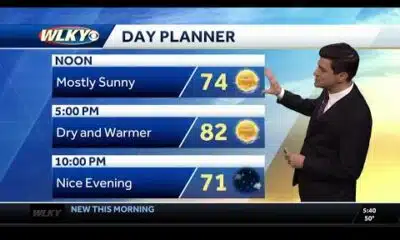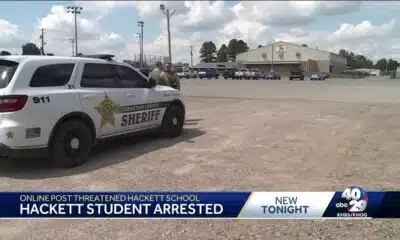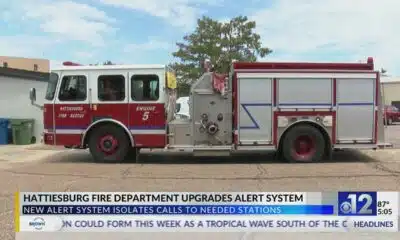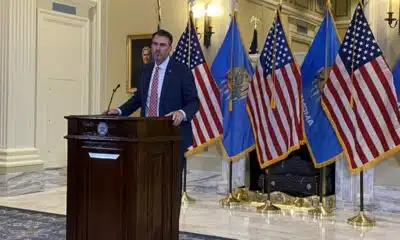News from the South - Texas News Feed
FEMA uncertainty hangs over hurricane season
SUMMARY: Uncertainty clouds the 2025 hurricane season amid NOAA’s forecast of above-normal activity and the Trump administration’s shifting stance on FEMA’s role. While some administration officials push to overhaul or eliminate FEMA, emphasizing state-led disaster responses, many states remain unsure about future federal support. Several states have formed task forces to prepare for potential changes, with bipartisan efforts focusing on disaster mitigation and funding. Meanwhile, cuts to FEMA programs like BRIC strain state budgets already stressed by rising disaster costs and healthcare funding gaps. Experts urge greater state investment in proactive risk reduction as federal funding becomes less predictable.
The post FEMA uncertainty hangs over hurricane season appeared first on www.kxan.com
News from the South - Texas News Feed
Houston Texans QB C.J. Stroud on Austin, faith, mentorship and this NFL season
SUMMARY: Houston Texans quarterback C.J. Stroud, a promising NFL talent and Ohio State alumnus, visited Austin’s C4 Nutrabolt headquarters to film a C4 Energy video. His partnership with C4 began in college, and he values the brand’s community involvement. Stroud, who spends time in Austin due to his agent and charity events, appreciates the city’s nature and local spots like The Guest House and lakes. A man of faith, he credits spirituality and mentorship for his growth, encouraging young athletes to embrace failure and be authentic. Focused on personal improvement heading into the new season, Stroud feels grateful for his Houston home and C4 partnership.
The post Houston Texans QB C.J. Stroud on Austin, faith, mentorship and this NFL season appeared first on www.kxan.com
News from the South - Texas News Feed
NY AG steps into legal fight over abortion pills, shield law
“NY attorney general will intervene in Texas abortion pill access lawsuit” was first published by The Texas Tribune, a nonprofit, nonpartisan media organization that informs Texans — and engages with them — about public policy, politics, government and statewide issues.
Sign up for The Brief, The Texas Tribune’s daily newsletter that keeps readers up to speed on the most essential Texas news.
New York Attorney General Letitia James on Monday said she will intervene in a legal fight over Texas’ ban on abortion pills, escalating a national showdown between states that have restricted abortion access and others that are defending practitioners who offer services to out-of-state women.
Her decision came over a month after Texas Attorney General Ken Paxton sued a New York county clerk for refusing to file a six-figure judgment against a doctor accused of prescribing abortion drugs to a Texas woman. This continues a legal battle over shield laws that experts say will likely reach the U.S. Supreme Court.
“I am stepping in to defend the integrity of our laws and our courts against this blatant overreach,” James said in a news release. “Texas has no authority in New York, and no power to impose its cruel abortion ban here.”
In a statement to The Texas Tribune, Paxton called the New York attorney general “a lawless abortionist” and said that he will defeat her in court.
The legal fight first started in December 2024 when Paxton sued Dr. Margaret Carpenter, accusing her of mailing abortion pills from New York to a woman in Collin County in violation of Texas law. Carpenter is the co-founder of the Abortion Coalition for Telemedicine, which helps abortion providers in states with so-called shield laws.
Shield law protections, which exist in over 20 states, seek to legally protect health care professionals and others who provide abortion-related services to those who live in states with abortion bans.
In February, a Collin County judge ordered the New York doctor to stop providing abortion pills to Texans and to pay more than $113,000 in penalties and fees.
Acting Ulster County Clerk Taylor Bruck refused to file the judgment in March and cited his state’s shield law, which was passed in 2023 following the overturn of Roe v. Wade.
Bruck again rejected a second Texas attempt to enforce the judgment in July.
Paxton then sued the clerk later that month in Ulster County. His office also argued in a court document that New York’s shield law violates the U.S. Constitution’s full faith and credit clause, which requires states to respect other states’ “public acts, records, and judicial proceedings.”
“No matter where [Carpenter] hides, our pro-life laws will be enforced, and justice will be served,” Paxton said Monday. “The Constitution expressly requires states to recognize the judicial enactments of other states’ courts, and New York, unsurprisingly, is choosing to ignore that constitutional requirement.”
James said she will submit a legal filing later this month to argue that New York has the legal right to safeguard its residents and courts against “out-of-state overreach.” She said Monday that she has formally notified the case’s judge of that decision.
“Our shield law exists to protect New Yorkers from out-of-state extremists, and New York will always stand strong as a safe haven for health care and freedom of choice,” she said in the news release.
Besides this legal fight with New York, Paxton has joined over a dozen other attorneys general from Republican-led states in July in calling on Congress to take action against abortion shield laws. They similarly argued that such laws infringe on the Constitution’s full faith and credit clause and the extradition clause.
The Texas Legislature also just advanced a bill allowing private residents to sue anyone who manufactures or distributes abortion drugs to or from the state. Gov. Greg Abbott has yet to take action on the legislation passed during the second special session.
Shape the future of Texas at the 15th annual Texas Tribune Festival, happening Nov. 13–15 in downtown Austin! We bring together Texas’ most inspiring thinkers, leaders and innovators to discuss the issues that matter to you. Get tickets now and join us this November.
TribFest 2025 is presented by JPMorganChase.
This article originally appeared in The Texas Tribune at https://www.texastribune.org/2025/09/08/exas-new-york-abortion-pill-access-lawsuit-shield-law/.
The Texas Tribune is a member-supported, nonpartisan newsroom informing and engaging Texans on state politics and policy. Learn more at texastribune.org.
The post NY AG steps into legal fight over abortion pills, shield law appeared first on feeds.texastribune.org
Note: The following A.I. based commentary is not part of the original article, reproduced above, but is offered in the hopes that it will promote greater media literacy and critical thinking, by making any potential bias more visible to the reader –Staff Editor.
Political Bias Rating: Center-Left
This article is framed with a neutral to center-left leaning perspective. It reports on a contentious legal battle over abortion pill access, highlighting actions taken by Democratic New York Attorney General Letitia James and Texas Republican Attorney General Ken Paxton. The article gives considerable attention to New York’s shield law protections and frames Texas’ abortion restrictions as “cruel” and an “overreach,” reflecting language often used in progressive discourse supporting abortion rights. However, it also fairly includes perspectives and legal actions from conservative actors, maintaining an overall factual tone typical of center-left news outlets focused on issues of reproductive rights and state-level legal conflicts.
News from the South - Texas News Feed
Ariana Grande, Lady Gaga shine at MTV VMAs with wins and performances
SUMMARY: At the 2025 MTV Video Music Awards, Ariana Grande won Video of the Year and Best Pop Video, thanking “therapists and gay people” in her speech. Lady Gaga, the top nominee, won Artist of the Year and performed at Madison Square Garden, emphasizing the deep meaning of artistry. Mariah Carey received the Video Vanguard Award with a medley of hits, while a tribute celebrated the late Ozzy Osbourne with performances by rock legends. Busta Rhymes earned the inaugural Rock the Bells Visionary Award, and Ricky Martin received the first Latin Icon Award. Hosted by LL Cool J, the show featured performances by Doja Cat, Post Malone, Taylor Swift, and more, broadcast on CBS for the first time.
The post Ariana Grande, Lady Gaga shine at MTV VMAs with wins and performances appeared first on www.kxan.com
-
Mississippi Today6 days ago
Brandon residents want answers, guarantees about data center
-
News from the South - Texas News Feed5 days ago
Texas high school football scores for Thursday, Sept. 4
-
News from the South - Arkansas News Feed7 days ago
Hackett student arrested after shooting threat
-
Our Mississippi Home6 days ago
Southern Miss Faculty and Student Contribute to Groundbreaking NOAA-Funded Plastic Cleanup
-
The Conversation6 days ago
AI is transforming weather forecasting − and that could be a game changer for farmers around the world
-
News from the South - Oklahoma News Feed7 days ago
Family sues Roblox, accusing them of failing to protect kids from predators
-
Mississippi News Video7 days ago
Hattiesburg Fire Department to implement new alert system
-
News from the South - Oklahoma News Feed7 days ago
Thousands of State Employees Still Working Remotely











































